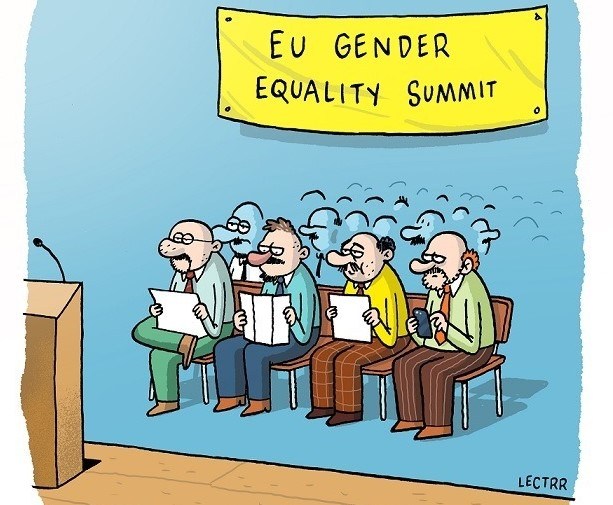Despite EUs commitment to gender equality too little has been done to mainstream gender in the EU budget and to actively promote gender equality in policy-making, according to a special audit report published on Wednesday by the European Court of Auditors (ECA).
ECA writes that the idea behind gender mainstreaming is simple. Gender needs to be taken into account at all stages and in all areas of policy-making and policy implementation. Gender-responsive budgeting is not just about funding explicit gender-equality initiatives. It is about understanding the impact of budgetary and policy decisions on gender-equality goals.
Gender equality is recognised as a significant driving force behind economic growth. The report cites a study by the European Institute for Gender Equality (EIGE). The study estimates that improving gender equality could lead to an increase in EU GDP per capita of between 6.1 % and 9.6 % by 2050, with the potential impact on GDP in specific EU member states of up to 12 % by 2050.
A map in the report shows the impact by country. The lowest impact is in member states that already have a reputation of gender equality, such as the Nordic countries, The Netherlands and Ireland. (For comparison of policies in The Netherlands and Sweden, see this op-ed). At the other end of the spectrum are countries with low scores on gender equality (Belgium, Bulgaria, Croatia, the Czech Republic, Greece, Latvia, Italy, and Portugal).
The Commission itself describes progress towards achieving full gender equality as “slow”: Member states on average scored 67.4 out of 100 in the EU Gender Equality Index 2019, a score which has improved by just 5.4 points since 2005. However, the situation varies significantly between Member States.
The Gender Equality Index is produced by EIGE and measures gender equality in six domains: work, knowledge, power, money, health and time. The divided labour market is one of the key areas of gender inequality. In 2017, the participation of women in the EU labour market was about 11.5 percentage points lower than that of men, and women’s average pay was about 16 % lower.
“Gender equality is a fundamental EU value”, said Eva Lindström, the Swedish ECA member responsible for the report and explained that the audit was prompted by requests by the European Parliament and the Council. She also referred to EU’s international commitments.
“Commitments have been made, but progress towards achieving equality is too slow. Gender equality is at stake in Europe, and we know that effects of the Covid-19 pandemic are not gender-neutral. It is high time that the Commission acted and began to use gender budgeting in the new 2021-27 budget cycle, and in the Next Generation EU Instrument.”
The auditors assessed whether gender equality had been incorporated into selected EU funding programmes, covering 66 % of the 2014-2020 multiannual financial framework, MFF (€1 087 billion). The audit was mainly desk studies of Commission documents but included also programmes in two member states, Spain and Romania.
In addition, an independent expert was contracted to assess what consideration had been given to gender equality under the European Agricultural Guarantee Fund (EAGF), using four case studies from Spain, Ireland, Romania, and Sweden.
Does the EU budget integrate a gender perspective? The answer is negative, according to ECA, since key elements of such a perspective, such as gender analysis, gender-related objectives, indicators and accountability through reporting are largely missing. Why?
“It’s a sort of gender blindness,” explained Lindström, “although there is no lack of performance indicators on other areas.” The audit covered a number of Directorates-General (DGs) responsible for the different expenditure programmes but the primary responsibility for the lack of gender mainstreaming in the EU budget was put on DG Budget.
The ECA member admitted that gender equality is a member state competence which should be advanced by national legislation, awareness building, and reforms in for example child care and taxation. Sweden could serve as model, especially its emphasis on the economic independence of both parents by an income tax reform in 1971 which abolished the joint taxation of spouses.
A significant amount of EU funding will be spent under the EU Recovery package (Next Generation EU) and the new 2021-2027 MFF, and the auditors make a number of specific recommendations to help the EU to live up to its commitment to gender mainstreaming. All recommendations have been accepted partly or completely by the Commission.
In particular, ECA recommends that the Commission assess and report whether member states’ recovery and resilience plans address gender equality. By now the Commission has received a total of 19 plans, from Belgium, Denmark, Germany, Greece, Spain, France, Croatia, Italy, Cyprus, Latvia, Lithuania, Luxembourg, Hungary, Austria, Poland, Portugal, Slovenia, Slovakia, and Finland.
The Commission will assess the plans within the next two months based on the eleven criteria set out in the Resilience Facility Regulation and translate their contents into legally binding acts.
A Commission spokesperson told The Brussels Times today (28 May) that the Commission has begun its in-depth assessment of the official plans it has received but gender mainstreaming does not feature among the 11 assessment criteria of the regulation. However, the Commission promises that it “will strongly reflect on the way gender mainstreaming has been included in the plans.”
“The economic empowerment of women is essential in order to build resilient societies. The Regulation provides that gender equality and equal opportunities for all should be taken into account and promoted throughout the preparation and implementation of recovery and resilience plans. The plans are expected to contribute to promoting gender equality and equal opportunities for all.”
M. Apelblat
The Brussels Times

